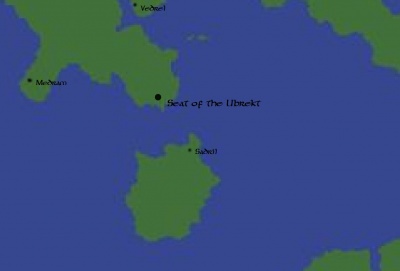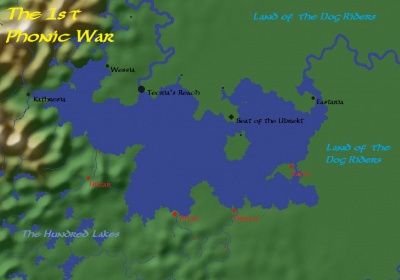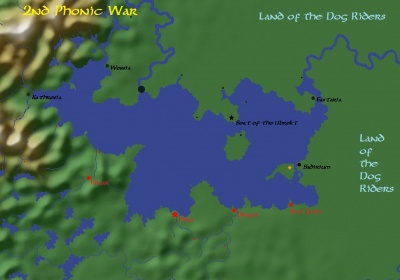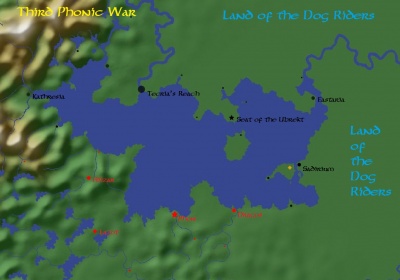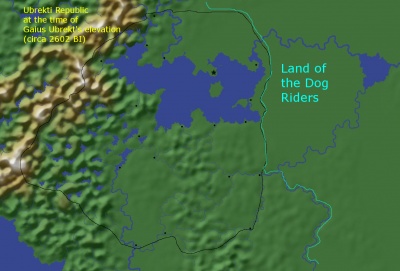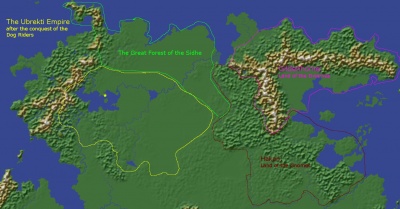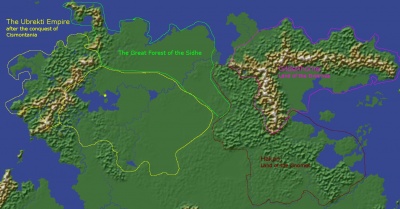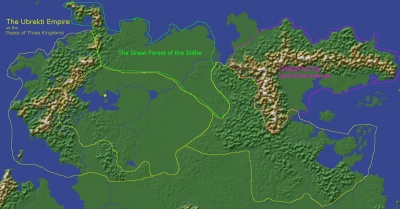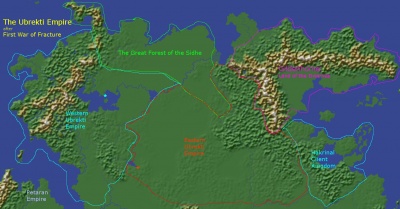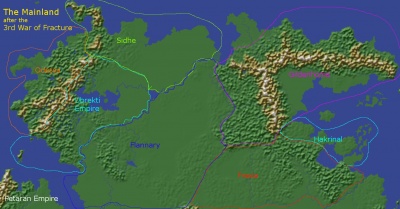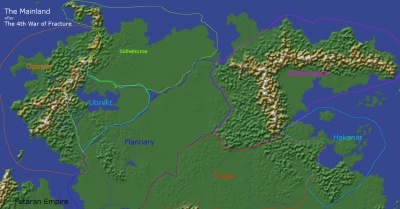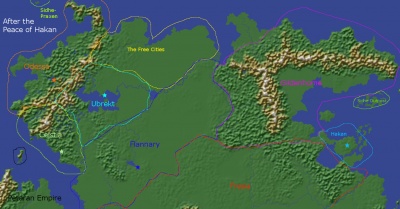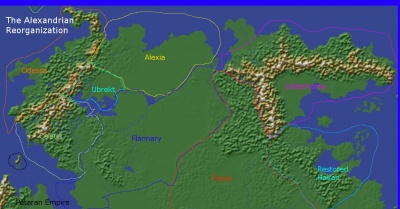Ubrekt
Name:The Kingdom of Ubrekt
Adjective: Ubrekti
Capital: Seat of the Ubrekt (Ubrekt City)
Although Ubrekt is the smallest nation on the mainland, it boasts quite possibly its richest history. The kingdom is named after a single city, the Seat of the Ubrekt, which has served as the nation's capital through its various incarnations, from antiquity to the present day. The gentle hills of the Plains of Wraith dominate the south of the nation, while the north is thin woodlands that eventually give way to the Crestfall Forest, with the Stormchalice to the south. The land is fertile, with bountiful rainfall, and is largely agrarian inland, with the only major cities being the various provincial capitals: Havredil, Turstram, and Sherdam. On north coast of the Stormchalice, however, there are several mid-sized trading cities, collectively known as the Emperor's Pearls. The nation is a mix of original Ubrektis inhabitants and the Hakni who were forced migrated there beginning in 19 BI, along with various refugees and displaced peoples from other nations drawn to Ubrekt's central location and its Pre-Alexandrian history of cultural tolerance. Despite fourteen intervening centuries, the two plurality populations have remained remarkably distinct, and pockets of other nationalities have proven to be quite resistant to assimilation, as well . This mixing has led Ubrekti in Post-Alexandrian times to be a tense and dynamic place, equal part cultural powerhouse and pot boiling over.
Contents
Government and Politics
At various points, Ubrekt has known itself as monarchy, democracy, republic, empire, theocracy, and most recently, a legislative monarchy. Political power is wielded in tandem by the Ubrekti King and the Senate, an august body that has existed in one form or another since prehistory. It is a contentious relationship that has proven to be surprisingly resilient, notwithstanding the occasional civil war every century or three.
The royal family, currently headed by King Luthor Megual, was installed by Alexandria Omnity herself after her own assumption of the title Empress of the Goodly Races and the fall of the Demi-Pantheon from among the Hakni nobility being migrated. As such, the crown has remained in Hakni hands for the vast majority of its existence, and is generally seen at this point as a birthright by the Hakni people. This monopoly on the monarchy is largely controlled by the exclusive right of lay investiture granted by the Hakani people due to their close association with Alexandria and the related struggles in bringing them into the light of Orthodoxy.
The Senate, on the other hand, is almost exclusively Ubrekti in character, and made up of the kingdom's most wealthy and powerful landowners and aristocrats, in many cases the progeny of families dating back to the Empire or earlier.
Economics and Industry
The economy of Ubrekt is not a strong one, nor is it equitable, but it has proven itself to be remarkably stable over the years. If that is good or bad, of course, is an open question.
When Alexandria assumed the Omnity, and the various churches of the Demi-Pantheon collapsed, she claimed for herself all of the lands they had formerly owned. In Ubrekt, that land was given to the new Hakni Royal Family, while the Ubrekti aristocrats were allowed to keep most of theirs. This decision, and demarcation, would prove to be the defining characteristic not only of Ubrekti politics, but also of its economy. After the Alexandria's Crusade, the Hakni returned to their new homeland only to discover there was far more of them than there was land to work, leading inevitably to a system of landlordism that plagues the nation to this day, with Hakni peasants and sharecroppers working Ubrekti farms.
Within the Plains of Wrath, frequent rains and fertile soil mean Alexia can always count on Ubrekti grain and Ubrekt can always count on Alexian coin, at least in the better times. By the late 14th century, a long serious of environmental, economic, and political calamities had broken the kingdom into desperate and independent city states in all but name. In the south, a thriving trade once existed along the Stormchalice with Flannary and Celstia, obviously dropping precipitously of late, as well. Exporting gems and ore wrested from the Kathrasian Range to the west still provides what wealth exists in the heartland of Alexandria's Crusade, while in the far north, the Crestfall Forest is thrives as a source of hides and lumber, although both are strictly controlled, as the forest itself is considered sacred.
History and Culture
Origins in Myth
- ~3000 BI - ~2850 BI (~150 years)
A hodge-podge of ethnic and cultural groups that banded together after the War of Sacrifice. Over the course of the two-century Cleansing Wars, led by the demigod Demi-Pantheon, they melded into a distinct culture of extremely hierarchical, semi-nomadic warriors. As the Cleansing Wars wound down and the Demi-Pantheon retreated behind the Celestial Veil, they settled on a peninsula on in the north shore of the Stormchalice, south of the Plains of Wrath, at the time controlled by the semi-nomadic dog riders.
Ubrekti City-State
- ~2850 BI - ~2725 BI (~125 years)
- City built by Hadrian Ubrekt, the grandson of Talos. The first Ubrekti colonies are established a decade or so later.
- As the emerging centers of civilization began to connect in trade networks, the city grew to be an important center of trade on the Stormchalice, developing a strong rivalry with the city of Phon. After a trio of Phonic Wars, Ubrekt slowly gained control of the great lake, eventually conquering Phon and bringing the entire Stormchalice under Ubrekti control.
- However, during after the Third Phonic War, the heirless King Hadrian II, grandson of Hadrian Ubrekt died. This led to a crisis of leadership and legitimacy.
Civil War
- ~2725 BI - ~2720 BI (~5 Years)
- An alliance of cities on the northern coast of the Stormchalice subdue secessionist movements in the cities of the on the eastern and southern coasts. Create a more decentralized republic form of government, with the cities of the stormchalice led by a coterie of elected officials, headed by an elected Imperitor.
Ubrekti Republic
- ~2720 BI - ~2620 BI (~100 years)
- The cities of the Stormchalice sends punitive expeditions north in response to halfling outrider raids and other meddling during the Civil War. Nothing much comes of the skirmish, but it plants the seeds of a long-lasting antipathy between the two nations. The two will clash frequently over the next century, contesting the eastern Stormchalice.
- Settles the Hundred Lakes and Stoney Valley south of the Stormchalice, as well as the lowlands to the east.
- Around 2640, war breaks out with the halfling. The war drags on for years and goes terribly for the Ubrekti almost from the outset, who are especially hampered by the constant turnover in military and political leadership. After nearly a decade of defeats and retreats, a powerful populist Senator - Gaius Estlionus - is elected Imperitor and pushes through a measure suspending elections "for the duration of the conflict."
- Estlionus uses his expanded political power at first not against the halflings, but against his own political opponents. For two years, he engages in a holding action in the East as purges and proscriptions destroy domestic opposition. He uses the money to raise and field an army - disciplined, well equipped, and loyal to Estlionus personally. Over the next five years, he reversed Ubrekti fortunes, eventually launcing an offensive into the heart of the halfling kingdom and conquering it utterly.
- The victorious Estlionus disperses the halfling people and keeps their lands for himself or rewards it to his followers. Gaius Estlionus, now in total control of Ubrekti politics, economics, and military affairs, pushes through a measure that declares him Gaius Ubrekt.
- From this point on, "Ubrekt" is more title than name.
Rise of the Ubrekti Empire
- ~2620 BI - 1440 BI (~1,200 years)
- Gaius consolidates wealth and power in the position of Emperor, and begins a new Ubrekti dynasty. It will, at least in name, rule Ubrekt for the next 1000 years.
- Gaius' son, Hemoclus Ubrekt, launches a campaign to conquer of the lands of Cismontania (modern day Odessa), an undertaking completed by his son, Milletus Ubrekt ~2585 BI.
- After Milletus' triumph, almost all of the human lands except for Petara. the Ulan, and the mountains of Celstia are under Ubrekti dominion.
- Over the next century, there are three major succession crises that lead to civil war. The third of these crises was actually triggered by Gnomish intervention. Once Fadstus Ubrekt was securely in control of the Empire, ~2495 BI, he launched a punitive expedition into Gnomish lands.
- The gnomes were slowly but inevitably crushed under the military might of a unified humanity. By ~2470 BI, all of the gnomes' land is under Ubrekti dominion and populated by Ubrekti settlers. The gnomes are driven into the forests, inhospitable hills, and underground burrows of the mainland. While the war with the gnomes technically only lasts a few decades, the gnomes will cause problems for their Ubrekti overlords for the next almost four centuries.
- The next three hundred years are relatively stable. The Ubrekti Empire launches several failed attempts to cross the Heretic Sea and conquer Petara, while gaining dominion over Udrell. There are the inevitable succession crises and civil wars. The Ubrekti Legions fight a guerrilla war against the gnomes. The Dwarves of Gildenhome twice fail in attempts to dislodge the humans from gnomish lands.
- ~2100 BI a third war breaks out with Gildenhome. For unknown reasons, the Elves break their thousands of years of neutrality to side with the humans. Elven magic and human arms visit on Gildenhome one of the few decisive defeats in their long history. The Peace of Three Kingdoms ends the conflict and forces the Dwarves to take in the remaining Gnomish refugees. This occurs in 2112 BI (year 738 of the Ubrekti Calendar).
- The next 600 years, known as the Long Peace, was in truth anything but peaceful. While the three nations did develop an economic "iron triangle" that prevented war, each would often meddle in the affairs of the other. The Ubrekti empire has dozens of succession crises and civil wars, which often became proxy wars for the Elves and Dwarves. Additionally, Ubrekti Monoculture begins to fragment, slowly poisoning the uniting underpinnings of the Empire.
- Uprisings, rebellions, and riots become more and more frequent in the last century-and-a-half of this period features the slow motion decay of the empire.
The Wars of Fracture & Long Decline
- ~1460 BI - 973 BI (~490 Years)
- A huge civil war breaks out in or around 1460 BI, taking close to 15 years to put down. The war is resolved around 1445, leaving the empire majorly indebted and tremendously unstable.
- In 1429, in order to better respond to crises and deal with continuing unrest in Cismontania, Declius Ubrekt gives Julianna Veromii imperial authority over the East. For the next decade, Veromii slowly consolidates her power and support in the East. In 1420 BI, she officially declared herself Empress of the East. After 25 years, and winning the backing of Gildenhome, Julianna forces the Ubrekt to acknowledge her sovereignty over the east. The Empire retains the province of Hakrinal in the far east.
- With the resolution of the First War of Fracture in 1404 BI, the human lands become divided into Eastern and Western Empires, with the east coming to be dominated by the culture and language that became Flannary.
- For the next century, the two empires uneasily coexist. Each staggers under the weight of substantial domestic unrest, however, so no war breaks out.
- The Empire of the East struggles to maintain control of what is know known as Fresia. In 1340 BI, a Dwarven-sponsored uprising that will become known as the Second War of Fracture breaks out in the Eastern Empire. With its resolution in 1285 BI, the Flannary are forced to cede tremendous territory to the new nation of Fresia. Thanks to the Dwarves' influence, and their desire to have a weak and pliable buffer against the Ubrekti, authority in Fresia is made to be tremendously decentralized.
- The Empire in the West struggles to maintain control of Cismontania. In 1204 BI the Third War of Fracture begins, eventually leading to the independence of Odessa in 1152 BI.
- By 1150 FI, the Emperor reigns over a pale shadow of an empire. Over the next hundred and fifty years, the Odessans slowly wrest control of Celestia and Udrell from the Ubrekti.
- In 983, the colony-province of Hakrinal revolts, leading to the Fourth War of Fracture. The Emperor at the time, Draximius Ubrekt, sunk the remaining fortunes of the empire into trying to hold onto the province, warring constantly with Flannary for a decade in the process, leading to his being deposed in a palace coup in 973 FI.
The Kingdom of Peace
- ~970 BI - 30 BI (~950 Years)
- After the execution of Draximius Ubrekt, office of the Emperor was officially abolished. As the Sidhe and Flannari stumbled towards war over the area, priests from both sides reached a compromise. The land would be given and dedicated to the gods, and the priests given leave to create a theocracy. The system that resulted left land ownership in the hands of the Senatorial class, and administrative and executive functions in the hands of the various priesthoods.
- For the next thousand years, "Natalia's Age", Ubrekt is stable and peaceful, never once launching a war or being attacked. It grows into the economic and culture center of the mainland, where all the nations of the world meet to trade and negotiate. While Ubrekti borders will never again expand, the soft power of the theocracy is tremendous.
Ubrekt & the Prophet's War
- 30 BI - 17 BI
- Ubrekt sees its first civil war in almost 1000 years in 29 BI, when the priests of Ubrekt declare against Alexandria and join the expanding Prophet's War.
- When Arek is killed in 20 BI, Ubrekt descends into civil chaos, as a capitulation-seeking Senatorial class skirmished with the priesthood. After a month, last of the die-hards are defeated and the dwarf Falzar is installed as High Priest by the Senators. He declares Ubrekti support for Alexandria and legitimizes her new nation of Alexia, formed from the old Free Cities. The priests are stripped of political power, and the (still mortal) Alexandria gives all church lands to the human Hakani, who she orders to force migrate to Ubrekt after reinstating the Gnomes to their ancestral lands. Most of these Hakani end up as tenent farmers on the estates of the Senatorial class.
- With the (unexpected by most) destruction of the Demi-Pantheon in 18 BI, and the subsequent reduction of magical power wielded by the priests of the Demi-Pantheon, Ubrekt again descended into chaos, as the Senatorial class began to extract centuries worth of grievances in a bloody purge. Alexandria was slow to react to this, eventually intervening to end the slaughter, confiscating a great deal of Senatorial land which she distributed to the Hakani.
Post-Alexandrian Ubrekt
- 17 BI - Present
- After Alexandria's martyrdom in 17 BI, and without her strong hand to keep the peace, Ubrekt descended into a century of conflict and warlordism, as the scions of Ubrekti wealth sought to reclaim the lands confiscated and given to the Hakani people and fought among themselves.
- By 150 FI, most of the people of the mainland have bought into Alexandrianism, and the now influential Church uses its influence - and soldiers - to bring order to the area and establish a dynastic kingship.
- For the next 1,300 years - more or less - Ubrekti is a minor player. Although still possessing much wealth, the overall economy is not particularly impressive nor is its power or prestige. All of this, plus Ubrekt's role as frequent battleground during Interregnums and no shortage of domestic civil unrest, work together to keep Ubrekt militarily and politically very weak.
Ubrekti of Note
(Many Of) The Ubrekti Emperors
